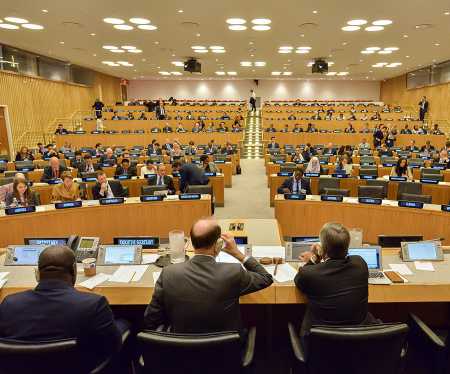“We continue to count on the valuable contributions of the Arms Control Association.”
Trump Administration Silent on CTBT
October 2017
By Shervin Taheran
At the UN Conference on Facilitating the Entry Into Force of the Comprehensive Test Ban Treaty (CTBT) held Sept. 20, the sole U.S. representative sat silently as senior officials from other nations expressed support for the landmark 1996 accord.
 The Trump administration, working without an undersecretary of state for arms control and international security, did not match the high level of representation exhibited by other governments and international organizations. Speakers included foreign ministers and other senior officials, such as EU foreign policy chief Federica Mogherini, UN Secretary-General António Guterres, and Lassina Zerbo, executive secretary of the Comprehensive Test Ban Treaty Organization (CTBTO).
The Trump administration, working without an undersecretary of state for arms control and international security, did not match the high level of representation exhibited by other governments and international organizations. Speakers included foreign ministers and other senior officials, such as EU foreign policy chief Federica Mogherini, UN Secretary-General António Guterres, and Lassina Zerbo, executive secretary of the Comprehensive Test Ban Treaty Organization (CTBTO).
The U.S. silence is particularly notable because the Trump administration is conducting a Nuclear Posture Review, which may include the question of whether the country can adequately maintain its nuclear arsenal without test explosions. The last U.S. nuclear explosive test was Sept. 23, 1992, and many experts have concluded that testing is not necessary to maintain a reliable nuclear stockpile.
The Trump administration has yet to comment publicly about the CTBT, which the United States signed in 1996 but has not ratified. It has commended the CTBTO International Monitoring System and capabilities for detecting nuclear test explosions, notably in the April 7 joint communiqué on nonproliferation and disarmament by Secretary of State Rex Tillerson and other foreign ministers of the Group of Seven.
Although the Trump administration has requested full funding for the CTBTO, in line with previous years, some Republicans in Congress are aiming to “restrict” that funding. (See ACT, March 2017.)
The United States is one of eight countries, known as the “hold-out states,” that must ratify the treaty
before it can enter into force. The others are China, Egypt, India, Iran, Israel, North Korea, and Pakistan. Of the eight, India, North Korea, and Pakistan have not taken the first step of signing the treaty.
Many nations at the session, informally known as the Article XIV conference, after the article in the treaty that advocates its convening, commended last year’s first UN Security Council resolution to specifically support the CTBT. A total of 42 countries, including Israel, co-sponsored Resolution 2310, which came 20 years after the treaty was opened for signature. (See ACT, October 2016.)
Yet, a reference to the resolution was absent in the final declaration of the conference, causing Mogherini to note, “We welcome the positive developments since the 2015 Article XIV conference . . . the adoption of UN Security Council Resolution 2310, which reaffirms the vital importance and urgency of achieving prompt entry into force of the treaty and its universalization. The European Union would have preferred to see a direct reference to this resolution in the final declaration.”
The Treaty on the Prohibition of Nuclear Weapons opened for signature the same morning as the Article XIV conference (See "Fifty States Sign Nuclear Weapons Ban," this issue), where the new accord was frequently mentioned in remarks by officials from countries supporting the new treaty.
Noting concerns among some of the member-states and signatories that the prohibition treaty is in conflict with the CTBT, Alexander Marschik, political director of the Austrian Foreign Ministry, said that the prohibition treaty text “recognizes the vital importance of the CTBT and its verification regime as a core element of the nuclear disarmament and nonproliferation architecture.”
“Its formulations regarding testing were very carefully drafted to ensure they are fully compatible with the CTBT,” he added. “Moreover, there is reason for hope that the success of the new prohibition treaty negotiations will create a positive impulse for our common objective here: the entry into force of the CTBT and the cessation of nuclear testing.”
China and Egypt were the only two “hold-out” states to speak at the conference, and neither offered a clear path on if or when they would ratify the CTBT. China’s statement only alluded to, but did not name, North Korea, the only country now conducting nuclear explosive testing.
Russia also took the opportunity to call out only the United States among the eight “hold-out” states, saying the “U.S. position,” as well as the doubtful effectiveness of the Article XIV process, could “undermine the hope” that the CTBT would eventually enter into force. “We have the impression that some states are satisfied with the current circumstances.”
The Article XIV conference was led by newly elected co-presidents Belgium and Iraq, which took over from Kazakhstan and Japan. Belgium and Iraq will continue in that role for two years until the next Article XIV conference, unless the treaty comes into force thereby eliminating the need for the conference.—SHERVIN TAHERAN
